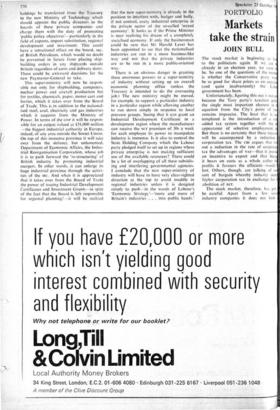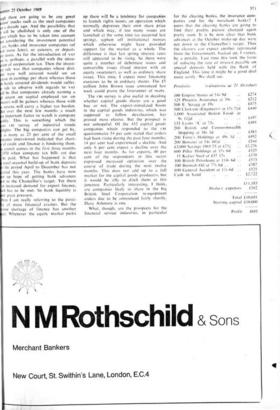PORTFOLIO
Markets take the strain
JOHN BULL
The stock market is beginning to to the politicians again. If we are already in an election year, we soon be. So one of the questions of the mo-; is whether the Conservative party w, be as good for share prices as on occa, (and quite inadvertently) the LL government has been.
Unfortunately, figuring this out is not because the Tory party's taxation pol the single most important element in equation from the City's point of vi remains imprecise. The least that is c templated is the introduction of a s,11 added tax system together with the d appearance of selective employment But there is no certainty that these melhu will be accompanied by a reduction corporation tax. The CBI argues that Si out a reduction in the rate of corporat tax the advantages of VAT—that it pros an incentive to export and that bec it bears on costs as a- whole rather t profits it favours the efficient—would lost. Others, though, are talking of so sort of bargain whereby industry acce higher corporation tax in exchange for abolition of SET.
The stock market, therefore, has got be careful. Apart from a few sers industry companies it does not look
lit
gh there are going to be any great lion' stocks such as the steel companies le a decade ago. And the possibility that will be abolished is only one of the ors which has to be taken into account considering the investment potential sa y, banks and insurance companies (of -h more later), or caterers, or depart- stores. As for the introduction of VAT re is, perhaps, a parallel with the intro- 'on of corporation tax. Then the invest- rule was that companies whose divi- s were well covered would see an rease in earnings per share whereas those barely covered dividends would suffer. rule to observe with regards to VAT d be that companies already earning a return on capital employed (or on over) will be gainers whereas those with returns will carry a higher tax burden. ut over the next few months a much re important factor to watch is company dity. This is something which the en! CBI survey of industrial trends lights. The big companies can get by, as many as 23 per cent of the small panics interviewed indicated that short- of credit and finance is hindering them. crunch comes in the first three months i970 when company tax bills are due be paid. What has happened is that usual seasonal build-up of bank deposits r the period April to December has not urred this year. The banks have now
n up hope of getting bank advances 'n to the Chancellor's target. Yet there n increased demand for export finance, ch has to be met. So bank liquidity is r great pressure.
ere I am really referring to the possi- y of more financial crashes. But the me shortage of finance has another ct. Whenever the equity market perks up there will be a tendency for companies to launch rights issues, an operation which normally depresses their own share price and which may, if too many issues are launched at the same time (as occurred last spring), syphon off institutional monies which otherwise might have provided support for the market as a whole. The difference is that last spring interest rates still appeared to be rising. So there were quite a number of debenture issues and convertible issues (fixed interest with an equity sweetener), as well as ordinary share issues. This time, 1 expect most financing exercises to be in ordinary shares. The £5 million John Brown issue announced last week could prove the forerunner of many.
The CBI survey is also useful in deciding whether capital goods shares are a good buy or not. The export-stimulated boom in the capital goods industries, which was supposed to follow devaluation, has proved most elusive. But the prospect is not unhopeful. Of the 452 capital goods companies which responded to the CBI questionnaire 54 per cent stated that orders had been rising during the past four months: 14 per cent had experienced a decline. And only 6 per cent expect a decline over the next four months. As for exports, 40 per cent of the respondents in this sector expressed increased optimism over the course of trade during the next twelve months. This does not add up to a full market for the capital goods producers, but it would be silly to ditch them at this juncture. Particularly interesting, I think, are companies likely to share in the big British Steel Corporation re-equipment orders due to be announced fairly shortly. Davy Ashmore is one.
What, though, are the prospects for the financial service industries, in particular
for the clearing banks, the insurance com- panies and for the merchant banks? I guess that the clearing banks are going to find their profits picture changed again pretty soon. It is by now clear that hank advances at the October make-up day were not down to the Chancellor's target. Thus the clearers can expect another reprimand from the Government, backed up, 1 expect, by a penalty. Last time this took the form of reducing the rate of interest payable on special deposits held with the Bank of England. This time it might be a good deal more costly. We shall see.
Portfolio (valuations at 21 October)
100 Empire Stores at 54s 9d £274 125 Phoenix Assurance at 34s £212 500 E. Scragg at 19s £475
500 Clarkson (Engineers) at 17s 7.4c1 £440
1,000 Associated British Foods at 9s Ilid £497 133 Lyons 'A' at 73s £488 200 British and Commonwealth Shipping at 38s 3d £383 200 Forte's Holdings at 49s 3d .. £492 200 Bowater at 54s 101d . £544 £3,000 Savings 1965-75 at £75/ £2,276 600 Pillar Holdings at 17s 6d £525 15 Kaiser Steel at £37 17s 1.570 100 British Petroleum al. 114s 6d .. £573 100 Burrnah Oil at 77s 6d .. £387 600 General Accident at 17s 6d £525 Cash in hand £2,722
£11,183 Deduct: expenses
Total Starting capital Profit £681 £502 £10,681 £10,000



















































 Previous page
Previous page